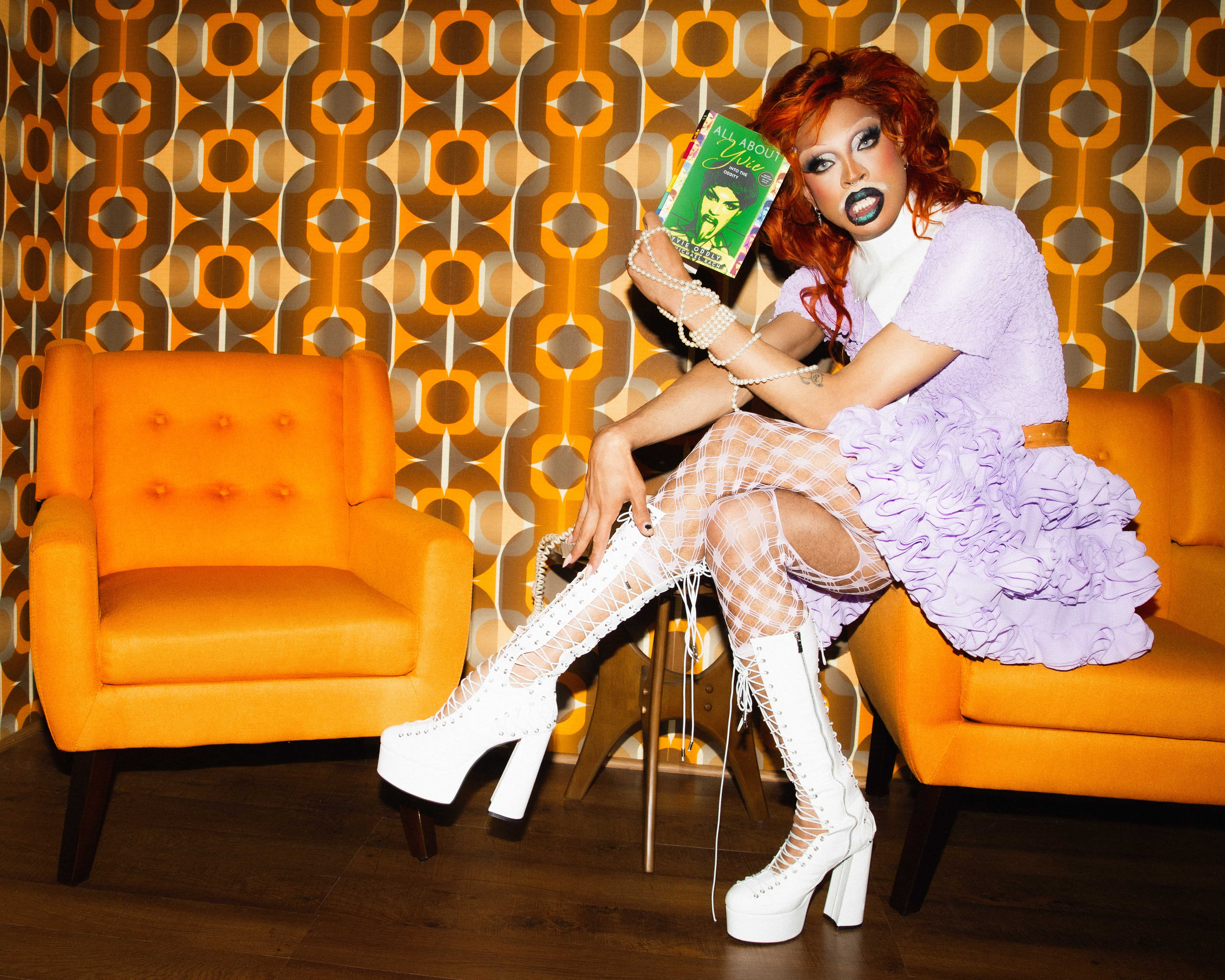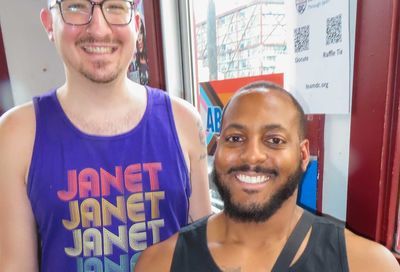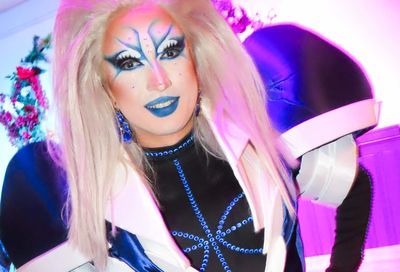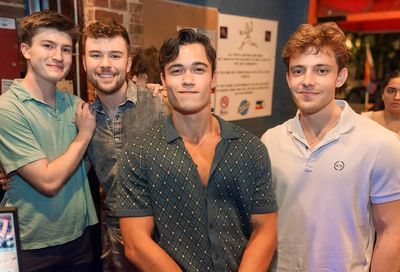Closing Calls: DC’s LGBTQ bars and restaurants respond to coronavirus
As the COVID-19 pandemic hits hard, the industry shuts its doors to help combat the spread
By John Riley on March 19, 2020 @JRileyMW

(Editor’s Note: Due to the coronavirus pandemic, Metro Weekly is temporarily replacing our printed edition with our new Digital Edition! It’s just as informative, just as fun, and has the added bonus of being interactive. A new issue is published every Thursday. Read the latest edition here!)
Movie theaters, gyms, spas, massage parlors — all have been directed to shut down. Restaurants and taverns can only serve takeout and delivery. Nightclubs are shuttered. It was all part of a progressive series of orders from Mayor Muriel Bowser, that started on Friday, March 13.
Washington, D.C. is, effectively, in hibernation.
The order arrived as Bowser attempted to take extra-tough measures to discourage residents from carousing in public, in the hopes that social distancing will reduce the rapid spread of the Coronavirus that causes COVID-19.
“There is, of course, a lot more that we need to learn about COVID-19, but one thing we do know is that social distancing can mitigate the spread of the virus,” Bowser said at a press conference Monday afternoon. “At the moment, social distancing is our main tool.”
Effective at 10 p.m. on Monday, all licensed restaurants and taverns were only allowed to offer carry-out or food delivery to customers, but all dining or drinking on the premises was prohibited.
The mayor’s Monday directive came on top of additional restrictions on restaurants and taverns that she introduced on Friday and clarified on Sunday, based on recommendations from D.C. Department of Health. The DOH guidelines called for limiting the number of customers to fewer than 250, suspending all bar seating, suspending service to standing persons, limiting the maximum number of people who could be seated at a table or booth to six, and placing six feet of distance between each table and booth. Bowser also announced that all licensed nightclubs or multi-purpose facilities would be forced to temporarily suspend operations. She warned that there would be repercussions for any establishment that attempted to flout the new rules, urging D.C. residents to report any bars or restaurants that continue serving seated customers.
“As mayor, I don’t wake up in the morning thinking about how I can shut down a business or order a fine,” she said. “But I’ll do it.”
Bowser’s words were underscored by actions earlier on Monday after the Hill Restaurant Group — which owns several D.C. restaurants, including Hawk ‘n’ Dove, Finn’s, Tortuga, Lola’s, Willie’s, Ophelia’s Fish House and Orchid — said in a private Facebook post that it would defy her earlier directive.
After the post was made public, Bowser raised the possibility of using police, the fire department, the health department, and other city regulatory agencies to close down any bar or restaurant not complying with the DOH guidelines. Hill Restaurant Group later backtracked and agreed to comply, but managing partner Tom Johnson told The Washington Post that he would be forced to start laying off people due to the city’s restrictions.
Bowser’s order, which remains in effect through the end of March, aligns with actions taken by other governors and mayors to lessen the severity of the epidemic and ensure that health facilities are not overwhelmed by a potential spike in infection rates. Also on Monday, Maryland Gov. Larry Hogan announced nearly identical actions meant to “flatten the curve” of the epidemic in his state.
Other states, including New York, Ohio, Illinois, Rhode Island, Massachusetts, Washington State, and California, as well as cities like New York City, have announced they are banning dining out in public, leaving the option of takeout or delivery open to their residents.
But even ahead of Bowser’s most recent directive, establishments that could have remained operational were choosing to voluntarily close, saying it simply wasn’t worth it to stay open. The effect was particularly acute in establishments that primarily serve the LGBTQ community or are LGBTQ-friendly.
David Perruzza, owner of Pitchers and A League of Her Own, had originally planned to close down the building that houses both bars six days of the week, but had hoped to get an exemption from D.C.’s Alcoholic Beverage Regulation Administration to host a show tunes night on Sundays. Patrons would have remained seated at tables spaced apart according to DOH guidelines.
“I called my insurance company, and the insurance doesn’t do anything, because it’s an epidemic,” he said. “They stopped covering that stuff after the swine flu. So I pay $54,000 a year in insurance to hope that no one falls down and sues me, and it doesn’t cover anything else.
“In all honesty, the Eagle and myself are the only two bars that could stay open if we wanted to,” Perruzza said, referring to the rigidity of the earlier DOH guidelines. “But, again, it’s not economical. And the shaming we get from people about opening is worse than everything else. The messages we got, just because we were open yesterday, you wouldn’t believe.
“I mean, people can be responsible and go out,” he continued. “Meanwhile, those same people went to brunch. You can shame a bar for being open, but you had no problem going to the grocery or gym, where those same people touched a thousand things that other people touched. But everyone’s shaming bars, because they don’t give a shit. They look at service industry people as if they’re ‘less than,’ and that pisses me off.”
Ed Bailey, co-owner of Number Nine and Trade, said both bars would be closed going forward, but called the situation surrounding COVID-19 “new and uncharted.”
“As a bar owner in D.C., this is not something we’ve had to navigate before, and so it has been complicated,” Bailey said. “Making decisions in an ever-evolving kind of atmosphere is challenging and you always want to get it right. So you’re trying to make your decisions based on some kind of principles and you have to have a clear understanding of what those principles are. We operate — and have always operated — with the best interests of our staff and community in mind.”
After Bowser sent tweets on Sunday clarifying her earlier directive, it became clear to Bailey that the DOH guidelines were “going to force us to operate in a manner that’s much different from the way we currently operate,” which also influenced the decision to temporarily close the doors.
“While we feel like the bars provide a valuable service in creating an opportunity for people to feel connected to the community and the basic human need for social interaction, now is not the time for that,” Bailey said. “We probably need to take a break from that for the sake of all of us. Hopefully, in the coming weeks, the situation unfolds in a way that we could feel comfortable and responsible about reopening.”
He said that reactions to the potential closures of his two bars ran the full gamut from people questioning why they were still open to people urging them not to close.
“One of the difficult parts of this is there’s a basic general understanding of what bars can do and how they can be part of the community, but everyone has their own personal feelings about whether this situation is scary or whether it’s annoying to them,” he said.
Miguel Ayala, a manager at the DC Eagle, said that the club could have stayed open, but owners made a decision to close after Bowser released her clarification of the DOH guidelines.
“I think the clarification on Sunday was much more helpful. I don’t think a lot of people on Friday understood the guidance. You’re technically not forced to close, but the spirit of what it’s saying is: there are things we shouldn’t be doing right now,” Ayala said. “For us, we don’t want to be a reason this pandemic gets worse. That guidance helped us understand we just shouldn’t be in operation right now.”
Ayala noted that the city and federal governments need to be taking steps to help shore up businesses and employees affected by the shutdown.
“People who rely on hourly wages, on contract work — whether they be DJs, drag queens, or whatever — and tipped workers are all going to be hit hard by this,” he said. “I think the city and federal government need to be looking at options to make sure that those people can apply for unemployment or other relief.”
On Tuesday, the D.C. Council passed emergency legislation, sponsored by Council Chairman Phil Mendelson (D), to allow small businesses to apply for grants to help cover costs, including payroll and operating costs, as well as a sales tax payment deferral for February and March.
The legislation also extends temporary unemployment benefits to employees, including tipped employees, who are either quarantined or out of work because of the shutdowns, bars utility companies from shutting off gas and water services for non-payment, and prohibits landlords from evicting tenants who are late in paying rent.
Justin Parker, co-owner of The Dirty Goose, told Metro Weekly in an email that his bar decided to close on Monday and will reopen once the District issues guidance that it is safe to do so. To assist their employees during this difficult time, the bar announced that 100% of all gift card proceeds will be distributed as “tips” to employees until the time that the bar can reopen.
Other bars are taking similar actions. Derrick Jones, marketing coordinator for the Green Lantern, said the bar managers are trying to set up a way for people to send tips to their bartenders via Venmo or Cash App to support them while the Green Lantern remains closed.
“When we announced the closure, we had people reaching out, saying ‘What can we do to help,’ because they knew the staff would be negatively impacted,” Jones said. “And this is the way we’ve figured out that they can do something.”
Jones said that, outside of the Hill Restaurant Group’s spat with Bowser, he hasn’t seen much pushback against the mayor’s orders.
“Everyone’s largely doing what they need to do, knowing that the faster we take action, the faster we come out on the other side. And if that means outright closing, it means outright closing,” he said. “Once we’re given the all-clear to reopen, we will do so, and welcome everyone back with open arms, but I think until then, it’s better for all of us if we follow the guidance and pour ourselves a martini at home.”
Read more:
Local health providers scale back non-essential services in response to COVID-19 pandemic
Gay conservative accuses LGBTQ groups of exploiting COVID-19 to “fuel fake victimhood narrative”
Rush Limbaugh guest host blames gay people for San Francisco coronavirus lockdown
Embracing the Weird: Yvie Oddly’s Journey from Isolation to Inspiration
The Drag Race winner reflects on her art, activism, and just-published memoir, "All About Yvie: Into The Oddity."
By John Riley on July 5, 2024 @JRileyMW
“I think if anyone is familiar with my work on Drag Race -- with the character on Drag Race -- honesty is very important to me,” says Yvie Oddly. “I wanted to take charge of telling my own story, since I felt like I could do it in a very, very honest way and just to clear the air, clear the board, set the record 'queer,' and let people know how I feel,” she says.
So the Denver-based drag queen who won the crown on Season 11 of the Emmy Award-winning reality television show wrote a memoir: All About Yvie: Into The Oddity.
“I know that people seem to relate to my story on Drag Race, so I figured why not let them have the full nitty-gritty chapter by chapter?” Oddly says.
The Success Story of The Little Gay Pub: From D.C. to Philadelphia
The three owners of D.C.'s popular Little Gay Pub reflect on their success and share their vision for their new venue in Philadelphia.
By John Riley on June 12, 2024 @JRileyMW
“Our dreams of opening this bar came true almost a year-and-a-half ago,” says Dito Sevilla, one of the three co-owners of Little Gay Pub. “It has succeeded, truly, beyond our wildest expectations.”
The popular LGBTQ bar, situated at 11th and P Streets NW in D.C.’s Shaw neighborhood, recently announced an expansion to Philadelphia’s historically gay Center City neighborhood. The move underscores its success in not only attracting customers but in promoting its brand beyond D.C.
Despite being open for just over a year, Little Gay Pub has attracted special visitors, ranging from politicos like former House Speaker Nancy Pelosi (D-Calif.), White House Press Secretary Karine Jean-Pierre, and Virginia State Sen. Danica Roem, to entertainers, including Billy Porter and the entire cast RuPaul's Drag Race All-Stars Season 9.
Support Metro Weekly’s Journalism
These are challenging times for news organizations. And yet it’s crucial we stay active and provide vital resources and information to both our local readers and the world. So won’t you please take a moment and consider supporting Metro Weekly with a membership? For as little as $5 a month, you can help ensure Metro Weekly magazine and MetroWeekly.com remain free, viable resources as we provide the best, most diverse, culturally-resonant LGBTQ coverage in both the D.C. region and around the world. Memberships come with exclusive perks and discounts, your own personal digital delivery of each week’s magazine (and an archive), access to our Member's Lounge when it launches this fall, and exclusive members-only items like Metro Weekly Membership Mugs and Tote Bags! Check out all our membership levels here and please join us today!
The Magazine
-
Most Popular
 Matt Walsh Blasts Amber Rose's Appearance at the RNC
Matt Walsh Blasts Amber Rose's Appearance at the RNC  Kamala Harris to Appear on "RuPaul's Drag Race All Stars" Finale
Kamala Harris to Appear on "RuPaul's Drag Race All Stars" Finale  Poll: Who Should Kamala Harris Pick as Vice President?
Poll: Who Should Kamala Harris Pick as Vice President?  J.D. Vance Blocked 30 Pro-LGBTQ Ambassadors
J.D. Vance Blocked 30 Pro-LGBTQ Ambassadors  Buttigieg Smacks Down Vance for "Childless Left" Comment
Buttigieg Smacks Down Vance for "Childless Left" Comment  Pete Buttigieg's Blistering Takedown of J.D. Vance
Pete Buttigieg's Blistering Takedown of J.D. Vance  Gay Porn Star Austin Wolf Arrested on Child Pornography Charges
Gay Porn Star Austin Wolf Arrested on Child Pornography Charges  Gay Porn Star Forced by Russian Police to Entrap Gay Men
Gay Porn Star Forced by Russian Police to Entrap Gay Men  Losing Its Mind Over Kamala Harris, MAGA Stoops to Ugly Name-Calling
Losing Its Mind Over Kamala Harris, MAGA Stoops to Ugly Name-Calling  Elon Musk Says "Woke Mind Virus" "Killed" His Trans Child
Elon Musk Says "Woke Mind Virus" "Killed" His Trans Child
 Poll: Who Should Kamala Harris Pick as Vice President?
Poll: Who Should Kamala Harris Pick as Vice President?  Kamala Harris to Appear on "RuPaul's Drag Race All Stars" Finale
Kamala Harris to Appear on "RuPaul's Drag Race All Stars" Finale  This Week's Advertisers: Issue of July 25, 2024
This Week's Advertisers: Issue of July 25, 2024  J.D. Vance Blocked 30 Pro-LGBTQ Ambassadors
J.D. Vance Blocked 30 Pro-LGBTQ Ambassadors  Buttigieg Smacks Down Vance for "Childless Left" Comment
Buttigieg Smacks Down Vance for "Childless Left" Comment  Elon Musk Says "Woke Mind Virus" "Killed" His Trans Child
Elon Musk Says "Woke Mind Virus" "Killed" His Trans Child  San Francisco's Legendary Gay Club Oasis Robbed at Gunpoint
San Francisco's Legendary Gay Club Oasis Robbed at Gunpoint  D.C. High School Ordered to Recognize Anti-Gay Group
D.C. High School Ordered to Recognize Anti-Gay Group  Vineyard Voyages: Driving Through Virginia's Wine Country
Vineyard Voyages: Driving Through Virginia's Wine Country  Losing Its Mind Over Kamala Harris, MAGA Stoops to Ugly Name-Calling
Losing Its Mind Over Kamala Harris, MAGA Stoops to Ugly Name-Calling
Scene
Metro Weekly
Washington's LGBTQ Magazine
P.O. Box 11559
Washington, DC 20008 (202) 638-6830
About Us pageFollow Us:
· Facebook
· Twitter
· Flipboard
· YouTube
· Instagram
· RSS News | RSS SceneArchives
Copyright ©2024 Jansi LLC.











You must be logged in to post a comment.